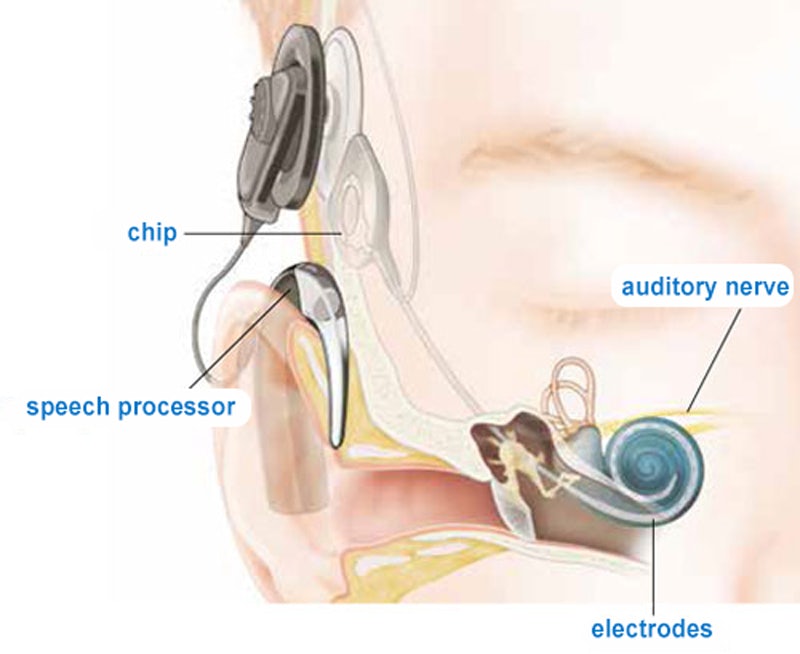Cochlear
Cochlear Implants are often a next solution for our patients, when their hearing aids are not providing enough assistance. Many people start by wearing two hearing aids. However, as hearing loss progresses, you may need something more. To improve your hearing performance and help you understand more clearly, you may need to consider a solution that helps you hear your best with both ears. For many, a cochlear implant in one ear and a hearing aid in the other can provide a richer more natural hearing experience. This combination is referred to as a bimodal hearing.
As a member of the Cochlear Provider Network, we work with local surgeons to assess and treat those who may be candidates for a hearing implant. At The Hearing & Balance Center, we conduct candidacy evaluations to determine if an implant might be right for you. We also support recipients of cochlear implants by meeting their needs for initial activation, interim programming, troubleshooting, upgrades, and even equipment orientation.
Dr. Nadler and Dr. McPheron, not only have the opportunity to connect their medically qualified patients with an existing, established implant center, they have the ability to assess the patient for implant candidacy before surgery, while also providing activation and programming services after surgery. Alternatively, participating surgeons benefit from the opportunity to work with patients who may have never been exposed to the option of implants, which means bringing implant services much closer to those who need them , improving accessibility and convenience.
“We can fit those with a mild hearing loss through a profound hearing loss. For those profound losses, we often recommend cochlear implantation, which sends that patient to an out-of-town office. By becoming a member of the Cochlear Provider Network (CPN), we save our patients several trips to out-of-town appointments; with providers they may not be familiar or comfortable with. We are excited to bring this cutting edge technology to our office and patients. ”
What is a Cochlear Implant?
A cochlear implant consists of a speech processor and an internal electrode. The speech processor houses a microphone which picks up sound from the environment and then it converts these sounds to electric impulses. The internal electrode receives the impulses and sends them to different regions of the auditory nerve.
A cochlear implant does not restore your normal hearing. However a majority of cochlear implant users experience an increase in their ability to understand speech and an improved quality of life.

Am I a candidate for a Cochlear Implant?
You may be a candidate for cochlear implant if your speech understanding in quiet is less than 50% while wearing hearing aids. To determine if you area a cochlear implant candidate, we recommend having a cochlear implant evaluation.
At a cochlear implant evaluation, we will perform a hearing test if you have not had one in the last 6 months. If you have had a hearing test in the last 6 months, please bring a copy of the results to your appointment.
We will also perform advanced speech testing. This will consist of repeating sentences and/or words in quiet and in background noise. This testing will be done while wearing a hearing aid.
The audiologist will then go over your options and show you the different types of processors. They will also help you establish realistic expectations for your results and answer any questions you may have.
You will need to meet with an ear, nose and throat physician who will give you an otologic exam, discuss the surgery, answer questions, and order and review a CT scan.
Occasionally, you will be required to obtain medical clearance from your general practitioner or other specialists you see in order to verify you are healthy enough for surgery.
Patient Testimony
“A hearing world has opened up to me since using a Cochlear Implant and using a Resound Hearing Aid,” said Mary Jude Vetter. “It is an incredible journey to hear sounds that you thought were lost, such as the chirping of birds, the sounds of young grandchildren voices, being able to understand speech and not having someone to repeat communications. The CI and hearing aid has made a difference in my life and the pleasure of living.”
